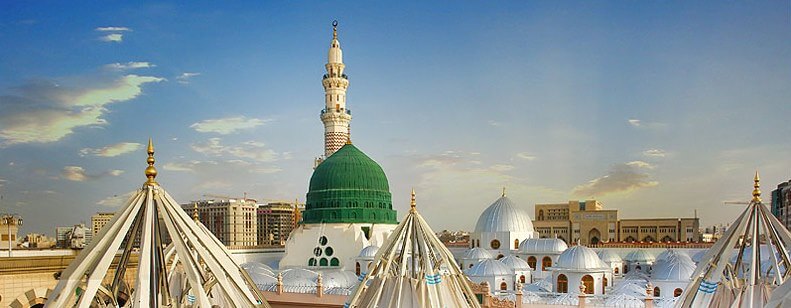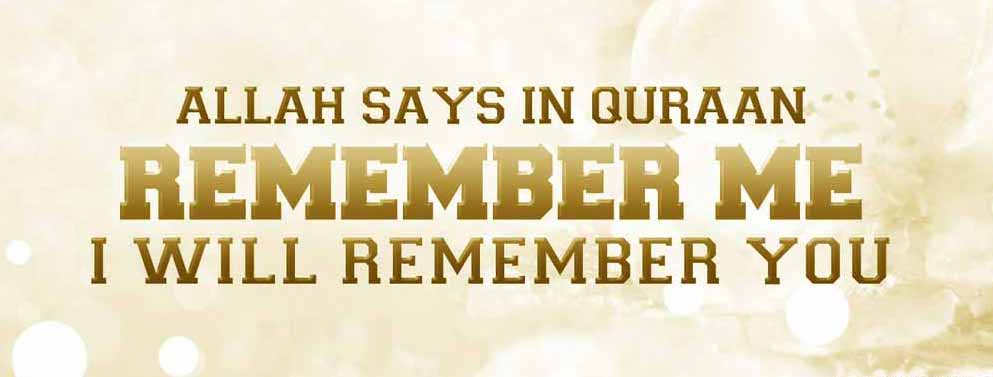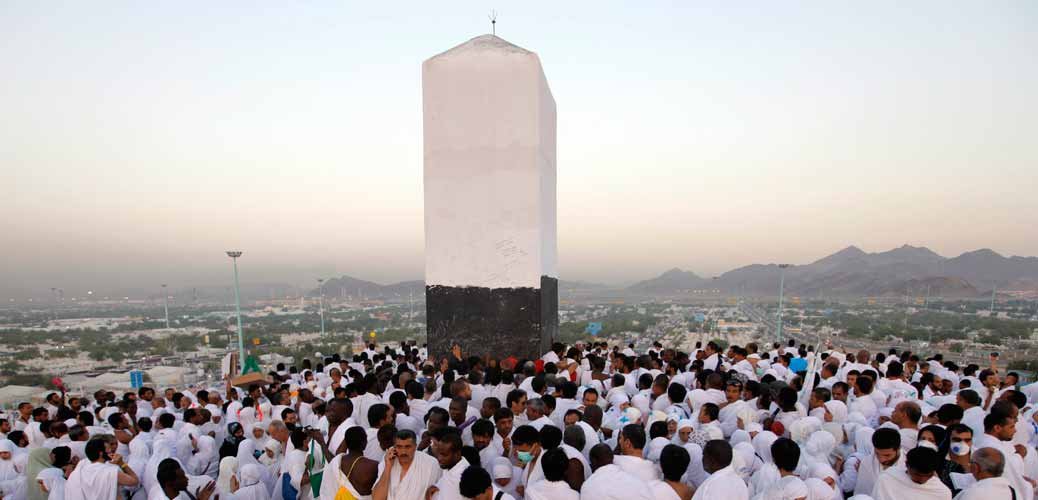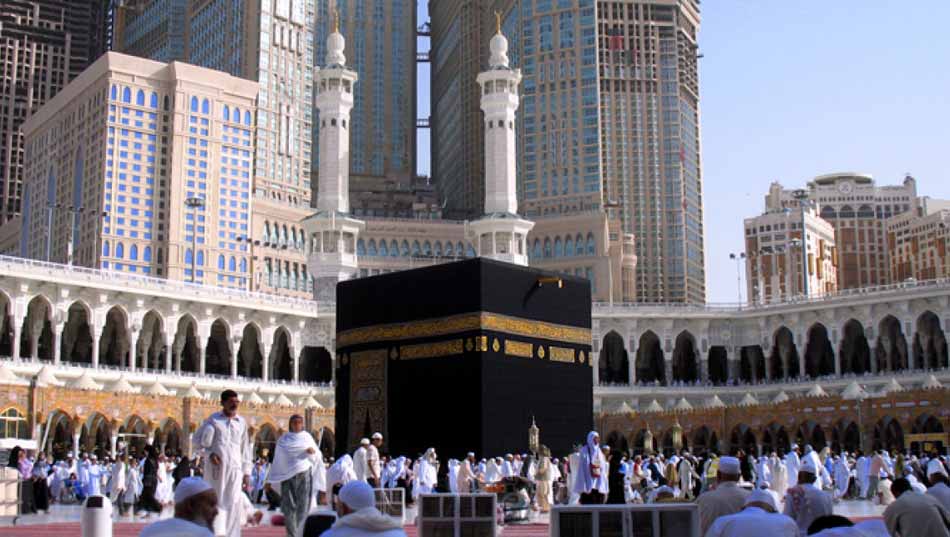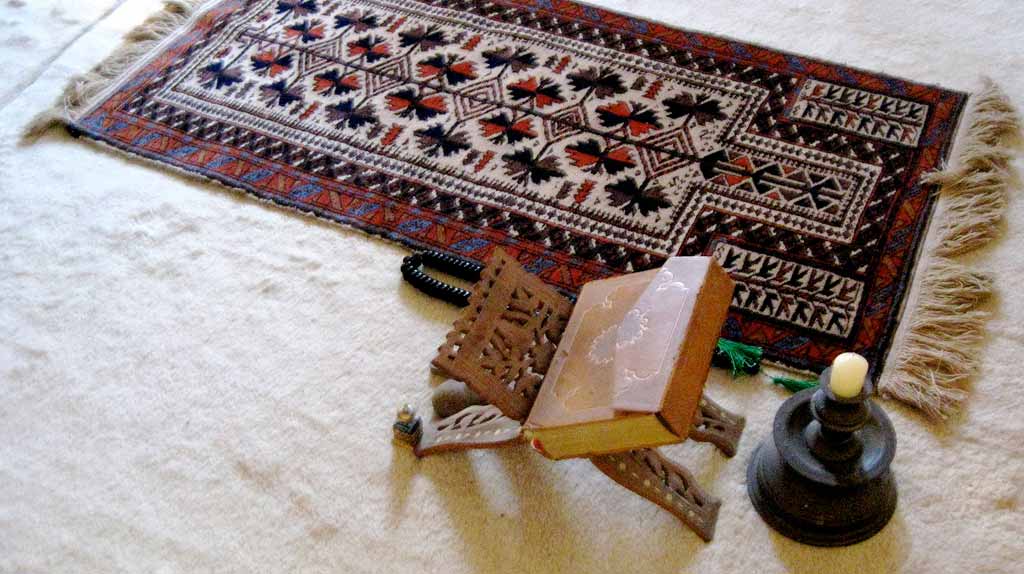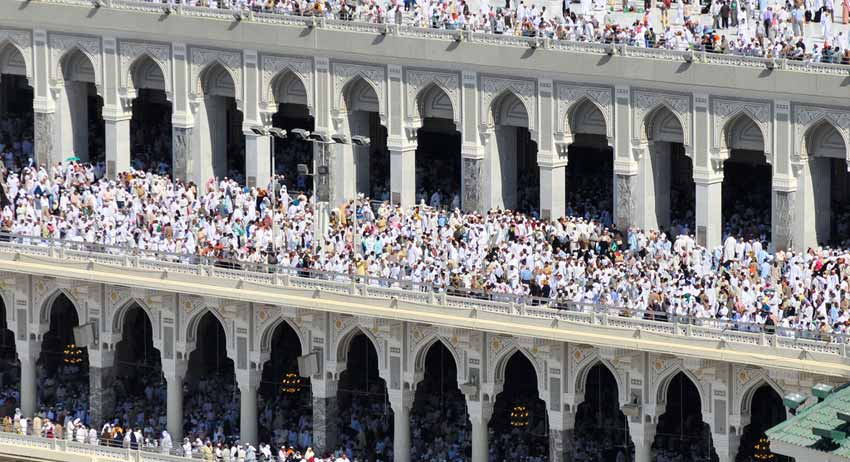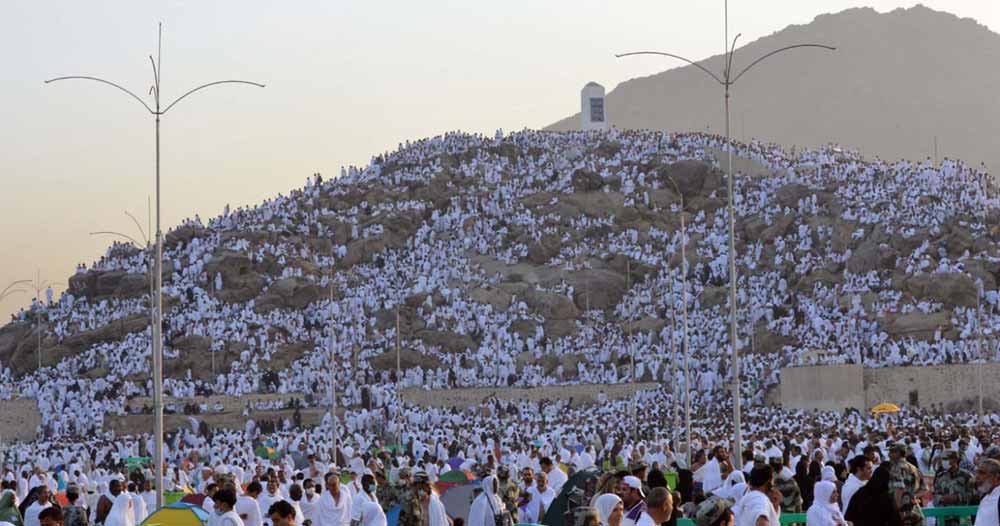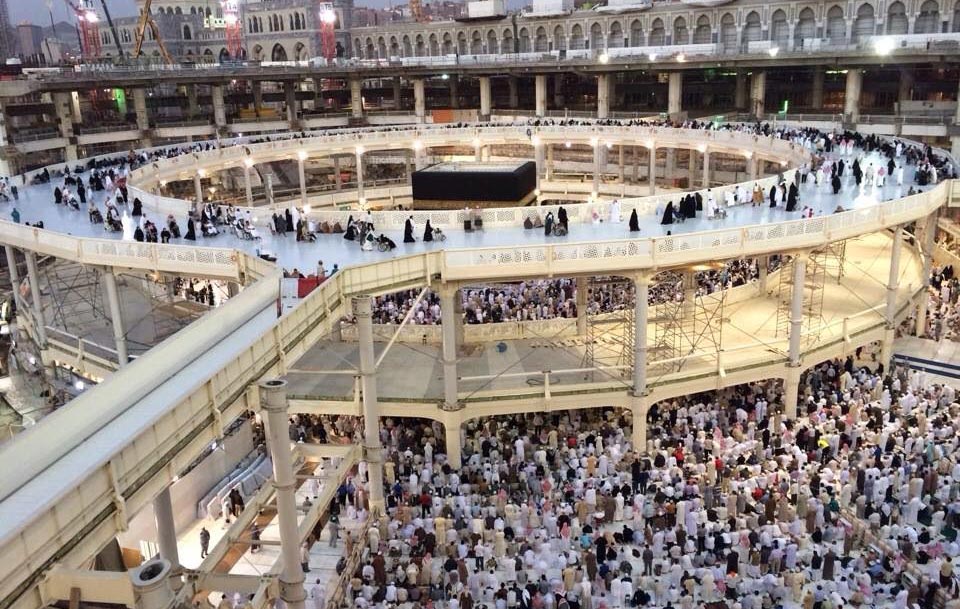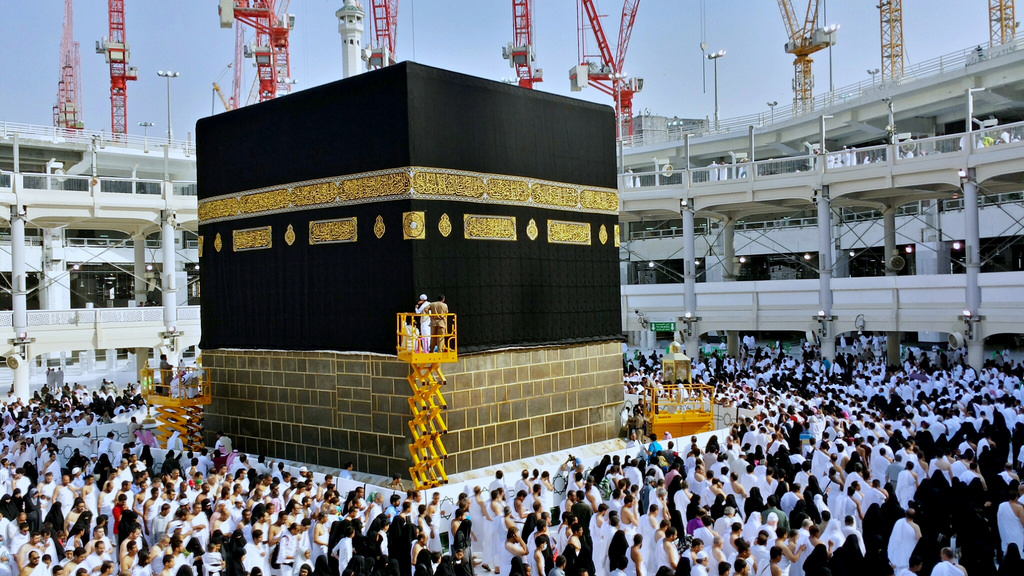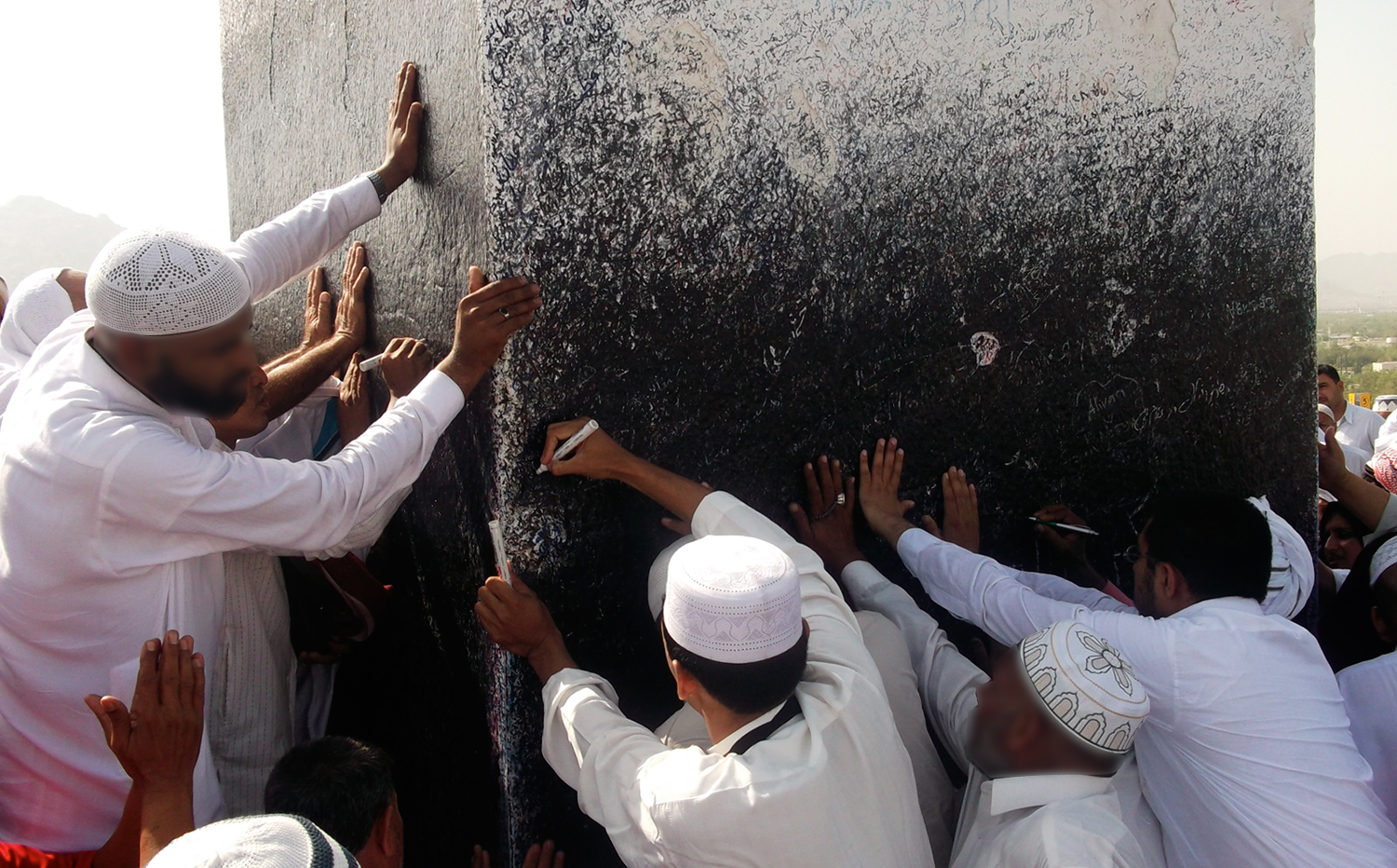
Method of Umrah
All the praises and thanks be to Allah alone, and peace and blessings of Allah be upon the last and seal of the Prophets, and upon all his family and companions.Now we are starting Method of umrah step by step.
1-Method of umrah If the one who wants to perform umrah reaches the miqat (the assigned point where ihram (consecration) takes place), it is recommendable for him to have a bath and wash himself .Women also do the same even if she is in menses or childbed. But she does not perform circumambulation until she becomes purified and has a bath. A man perfumes his body, but not the consecration clothes. If taking a bath in the miqat is not possible, so there is nothing wrong for him. It is recommendable to take a bath upon arriving to Mecca, before circumambulation, if possible.
2-A man takes off all his sewn clothes and wears a below-waist cloth and an above-waist cloth, they are better to be white and clean, and he is to uncover his face. As for women, they are to concentrate in their ordinary clothes, which are not of fame or adorned.
3- He then intends starting the ceremonies in his heart, and says by tongue: “labbayka umrah (Here I come for umrah)”, or “labbayka allahuma umrah (O Allah here I come for umrah)”. If a muhrim (a man in a state of ihram) is afraid that he may not be able to complete his ceremonies, that he is ill, or that he is afraid from an enemy or the like, it is lawful for him to stipulate upon starting the ceremonies and says “If a stopper confines me, so I will finish my ceremonies where You stop me”, for the Hadith of Dubâ’ah bint Az-Zubair, may Allah be pleased with her, in which she said, “O Messenger of Allah! “I want to perform pilgrimage and I feel sick”. He, prayers and peace of Allah be upon him, said: “Intend to perform pilgrimage and stipulate that “I will finish my ceremonies at any place where You stop me”, [Agreed upon its authentication]
«يا رسول الله ! إني أريد الحج، وأنا شاكية. فقال النبي صلى الله عليه وسلم: حجي، واشترطي أن محلي حيث حبستني» متفق عليه
He then recites the talbiya loudly such as the Prophet, prayers and peace of Allah be upon him, that is: “((Labbaika Allahumma Labbaik, Labbaika la sharika Laka labbaik, Inna-l-hamda wan-ni’mata Laka walmulk, La sharika Lak) which means: here I am, O Allah, here I am. Here I am. You have no partner. Here I am. Surely all praise, grace and dominion is yours, and you have no partner.))” [Agreed upon]
«لبيك اللهم لبيك، لبيك لا شريك لك لبيك، إن الحمد والنعمة لك والملك ، لا شريك لك» متفق عليه
He increases saying the talbiya as well as the remembrances and supplicates to Allah Almighty much. When he arrives to the Sacred Mosque, it is a Sunnah to enter first by his right leg and says: “In the name of Allah, and prayers and peace of Allah be upon the Messenger of Allah. I seek refuge with Allah the Great, with His noble Face and His old sovereignty from the expelled Satan. O Allah! Open to me the gates of Your Mercy”, such as all other mosques. He is then to be occupied with talbiya until he reaches the Ka’abah.
4- Upon reaching the Ka’abah he stops talbiya. He then goes to and turns his face to the Black Stone. He receives it by his right hand and kisses it if possible; he should not harm people by crowding. He says upon receiving it: “bism-allah wa allahu-akbar (In the name of Allah and Allah is the Greatest)”, or: “allahu-akbar (Allah is the Greatest)”. If it is difficult to kiss it so he can receive it with his hand, a stick or the alike and kiss what he receives it with. If it is difficult to receive it, he points to it and says: “Allah is the greatest” and he does not kiss what he points with. The terms of right circumambulation: A circumambulator must be purified from both kinds of impurities (the greater and the minor), as circumambulation is like praying, however, speaking is permitted.
5- He is to make the House to his left side, and to circumambulate seven times around it. If he is parallel to the Yemenite Corner, he is to receive it by his right hand, if possible, and says: “In the name of Allah and Allah is the Greatest” and does not kiss it. If it is difficult to receive it, he is to leave it and to continue his circumambulation, without pointing to it or saying Allah is the Greatest, because this has not been mentioned about the Prophet, prayers and peace of Allah be upon him. As for the Black Stone, whenever he is parallel to it he is to receive and kiss it and to say “Allah is the Greatest” – as we mentioned before- or he is to point to it and say “Allah is the Greatest”. Pacing is preferable- that is: to walk quickly with close steps – in all the first three rounds of the arrival circumambulation, especially for men.
It is preferable for a man to put the middle of his above-waist cloth under his right shoulder and its ends over his left shoulder in the arrival circumambulation, in all rounds. It is preferable to increase remembrances and supplications with whatever easily comes to mind in all rounds. There is no special invoking or remembrance in circumambulation. He is rather to invoke and remember Allah by whatever easy of remembrances and supplications. He is to say between the two corners, {Our Lord! Give us in this world that which is good and in the Hereafter that which is good, and save us from the torment of the Fire!} [Surat Al-Baqarah 2:201]
{رَبَّنَا آتِنَا فِي الدُّنْيَا حَسَنَةً وَفِي الآخِرَةِ حَسَنَةً وَقِنَا عَذَابَ النَّارِ} البقرة: 201
Transliteration: rabbana atinafee alddunya hasanatan wafee alakhiratihasanatan waqina AAathaba alnnari
In each round, because this is proven from the Prophet, prayers and peace of Allah be upon him. He is to end the seventh round by receiving and kissing the Black Stone, if possible, or pointing to it and saying Allah is the Greatest, according to the aforementioned details. After finishing circumambulation he is to wear his above-waist cloth by putting it over his shoulders and the two ends over his chest.
6- He is then to pray two prayer units behind the Maqâm (place of Ibrâhîm) [or the stone on which Ibrâhîm stood while he was building the Ka’bah], if possible. If he is not able, he can pray at anywhere in the Mosque. He is to recite in them after Al-Fâtiha: {Say: (O Muhammad to these Mushrikûn and Kâfirûn): “O Al-Kafirûn (disbelievers in Allâh, in His Oneness, in His Angels, in His Books, in His Messengers, in the Day of Resurrection, and in Al-Qadar)!} [Surat Al-Kâfirun], in the first prayer unit,
{قُلْ يَا أَيُّهَا الْكَافِرُونَ} الكافرون: 1
Transliteration: Qul ya ayyuha alkafiroona
and, {Say (O Muhammad): “He is Allâh, (the) One} [Surat Al-Ikhlâs] in the second prayer unit.
{قُلْ هُوَ اللَّهُ أَحَدٌ} الإخلاص: 1
Transliteration: Qul huwa Allahu ahadun
This is the best, but if he recites others, so there is nothing wrong in that. After finishing the two prayer units, he is to go to the Black Stone to receive it with his right hand, if possible.
7- He is then to get out to as-Safâ to ascend or stand at it, but ascending is better, if possible. He is to recite in the beginning of the first round the words of Allah Almighty, {Verily! As-Safâ and Al-Marwah (two mountains in Makkah) are of the Symbols of Allâh.} [Surat Al-Baqarah 2:158]
{إِنَّ الصَّفَا وَالْمَرْوَةَ مِنْ شَعَائِرِ اللَّهِ} البقرة: 158
Transliteration: Inna alssafa waalmarwata min shaAAairi Allahi
It is preferable to turn his face to the qiblah above as-Safa. He is to praise Allah and says Allah is the Greatest and says, “There is no god but Allah”, and “Allah is the Greatest. There is no god but Allah alone. He has no partners. To Him belongs dominion, and to Him belongs all praise, and He is Over all things Competent. There is no god but Allah alone, He has fulfilled His Promise, and has granted victory to His servant, and has defeated the parties Alone.” He is then to invoke Allah with what is possible while raising his hands. He is to repeat such remembrance and invoking (three times).
He is then to descend and move to al-Marwah, until he reaches the first flag, so he is to walk quickly, until he reaches the second flag. As for women, it is not lawful for them to walk quickly, as they are not to be exposed. He is then to walk and ascend or stand at al-Marwa. Ascending is better, if possible. He is to say and do over al-Marwa, as what he said and did over as-Safa, except reciting the mentioned verse, as this is lawful upon ascending as-Safa in the first round only, as a following to the Sunnah of the Prophet, prayers and peace of Allah be upon him. He is then to descend and walk in the place of walking, and hurries in the place of hurrying, until he reaches as-Safa. He is to do that seven times, as his going is a round and his returning is a round. If he performs these round riding, so there is nothing wrong in that, especially when necessary. It is preferable to increase remembrance and invoking during his walking with whatever easily comes to his mind, and to be purified from both kinds of ritual impurities. If he walks while he is ritually impure so it is satisfactory.
8- When he finishes walking, he is to have his hair cut or shaved, but shaving is better. If his coming to Mecca is near the time of pilgrimage, then cutting is better for him, to have the rest of his hair shaved in pilgrimage. A woman collects her hair and cut a hairbreadth or less. If a muhrim fulfils that, so his umrah is complete. All praises and thanks be to Allah. Everything which was forbidden for him due to consecration is now lawful.
May Allah help us and all our Muslim brothers to understand and adhere to His religion, and may He accept from all of us, He –the Almighty- is Generous.
Prayers and peace of Allah be upon His Slave and Messenger, Muhammad and upon all his family and companions and all his followers to the Day of Resurrection.
Article by: en.islamway.ne
